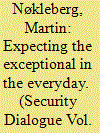| Srl | Item |
| 1 |
ID:
185184


|
|
|
|
|
| Summary/Abstract |
There has been considerable scholarly interest regarding the notion of exceptionality, i.e. how and under what conditions extraordinary powers and measures are justified in the name of security. Exceptional threats are now omnipresent in the security discourse of the aviation and maritime industries, and this influences the everyday working environment. Taking Norwegian airport and port security as its point of departure, this article analyzes how security and policing agencies perceive, experience, and respond to the exceptional as part of their everyday practice. Drawing on extensive interview material with security agencies, it reveals how agencies construct strategies to cope with the consequences of exceptionality that arise from heightened (in)security and vulnerability. This article demonstrates that instrumental logic in risk management is one crucial strategy, but evidence also reveals the importance of the human dimension in security practices, as the emotional aspect of security consciousness is a part of the everyday life of security agencies. Closely associated with this is the emergence of mechanisms of active resistance that provide excitement and alleviate boredom.
|
|
|
|
|
|
|
|
|
|
|
|
|
|
|
|
| 2 |
ID:
157227


|
|
|
|
|
| Summary/Abstract |
In the past two decades, a burgeoning plural policing literature has refocused the attention on the plurality of sponsors and providers that populate policing landscapes throughout the world. This article coheres and advances this research agenda in two ways. It provides the first critical examination of its conceptual and theoretical achievements, while also highlighting important gaps that remain in explaining how struggles over the political economy affect plural policing and vice versa. This requires applying political economy questions about power and resources to policing—“how,” by “whom,” and especially for “whose” benefit policing is delivered—and conceptualizing policing as one aspect of state–society relations. The article further elucidates strengths and weaknesses of the plural policing literature in a case study of Indonesia’s contemporary plural policing landscape. The importance of plural policing goes beyond academic endeavor. Indeed, plural policing is ubiquitous throughout the world and affects how security is provided, and power exercised, in most social realms whether at local, national or international level. It is thus a phenomenon difficult to ignore for comparative politics, IR scholars, and policymakers alike.
|
|
|
|
|
|
|
|
|
|
|
|
|
|
|
|